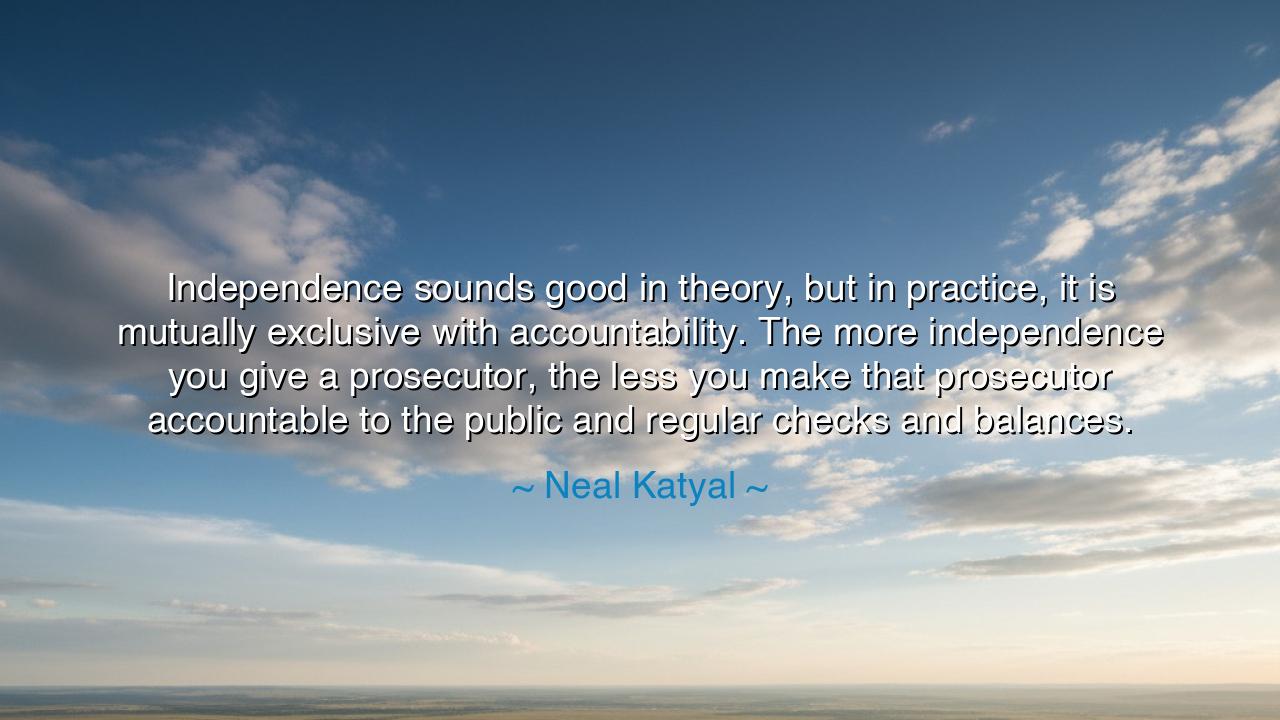
Independence sounds good in theory, but in practice, it is
Independence sounds good in theory, but in practice, it is mutually exclusive with accountability. The more independence you give a prosecutor, the less you make that prosecutor accountable to the public and regular checks and balances.






Listen, O children of the future, to the words of Neal Katyal, a man who speaks of the delicate balance between independence and accountability, two values that, while often exalted, must be carefully measured against one another. "Independence sounds good in theory, but in practice, it is mutually exclusive with accountability. The more independence you give a prosecutor, the less you make that prosecutor accountable to the public and regular checks and balances." These words strike at the heart of a difficult truth—that freedom and autonomy, when untempered by oversight, can lead to a dangerous erosion of responsibility.
In the ancient world, the struggle for power was often intertwined with the struggle for accountability. Take, for example, the mighty Athenian democracy. Athens, the cradle of democracy, prided itself on its system of governance where citizens had the power to vote and participate in decision-making. But the Athenian system also understood the dangers of unchecked power. The famous trial of Socrates serves as a stark reminder that even in a democracy, when authority is placed in the hands of the few and unaccountable, it can lead to injustice. Socrates, one of the greatest minds of antiquity, was sentenced to death by a system that, though founded on democratic principles, lacked adequate checks and balances in its implementation.
In the Roman Republic, the ideal of freedom was balanced by the structure of accountability. The Romans understood that power could corrupt, and therefore, they designed a system where leaders, even those in the highest positions, were always subject to the will of the Senate and the people. The Consuls, for instance, held great authority, but their power was limited by annual elections and the presence of checks from other branches of government. In this, Rome showed that independence could not thrive without being tempered by responsibility. A system of governance without such balance risks tyranny, where unchecked independence can lead to the abuse of power.
In modern times, the role of prosecutors in upholding the law is a delicate matter. Katyal’s words remind us that the independence of law enforcement and legal systems, while necessary for fair and impartial judgments, must always be checked by accountability. The example of the Nuremberg Trials after World War II demonstrates the need for accountability in the exercise of power. The prosecutors who brought Nazi war criminals to justice did so under the strict oversight of international law, ensuring that the power of judgment could not be wielded recklessly or without due process. This balance ensured that justice was served not by autonomy alone, but by a system that upheld the values of fairness and oversight.
The question then, O children, is not whether independence is good, but how it can be achieved while maintaining accountability. Katyal warns that the more independence we give, the more we risk losing checks on power. In every system, whether in the governance of a nation or in the conduct of one’s personal life, the lack of accountability leads to unchecked corruption and injustice. The ancient world understood this balance: power must be distributed and constantly subject to the scrutiny of those it serves. The American Founding Fathers knew this truth well when they built a system of separation of powers, with checks and balances to ensure no single branch of government could wield absolute power.
The lesson here is simple, yet profound: independence must never come at the expense of accountability. True freedom exists only when we are willing to be responsible for our actions, when we acknowledge the power we hold and exercise it with wisdom and foresight. Whether in the realm of government or in our personal lives, it is essential that we do not allow our autonomy to become an excuse for negligence or irresponsibility. Like the Athenian democracy, which valued both the power and the oversight of its citizens, so too must we balance independence with accountability in all aspects of life.
So, O children, let this wisdom guide you: seek freedom, but do not lose sight of responsibility. Independence is a gift, but it is a gift that must be accompanied by the strength of character to account for one’s actions. As you grow and take on positions of influence or power, remember that the mark of a truly free society—or a truly virtuous individual—is not in the autonomy they wield, but in the accountability they uphold. Only through this balance can we ensure that freedom remains a force for good, and that the power we carry does not corrupt, but strengthens, our commitment to justice.






AAdministratorAdministrator
Welcome, honored guests. Please leave a comment, we will respond soon